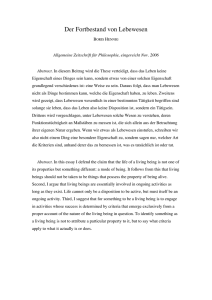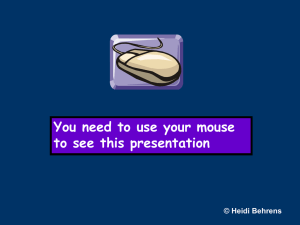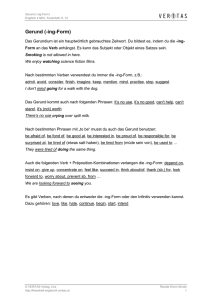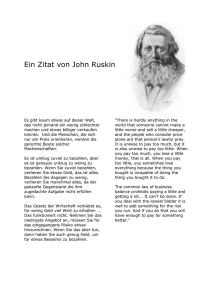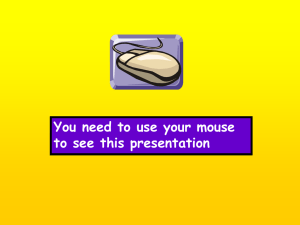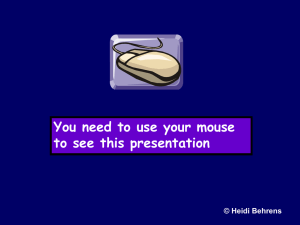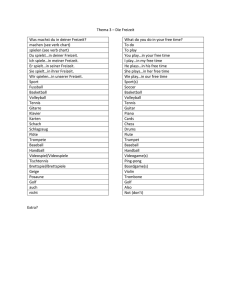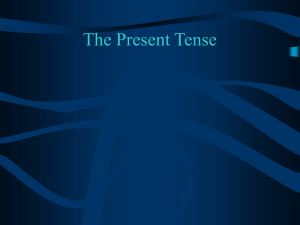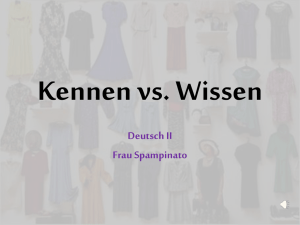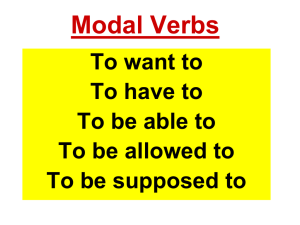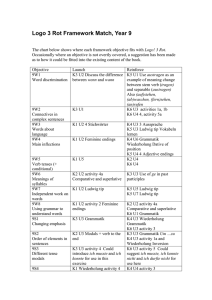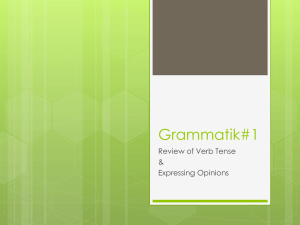Presentation PGCE students Goldsmiths 2015
Werbung
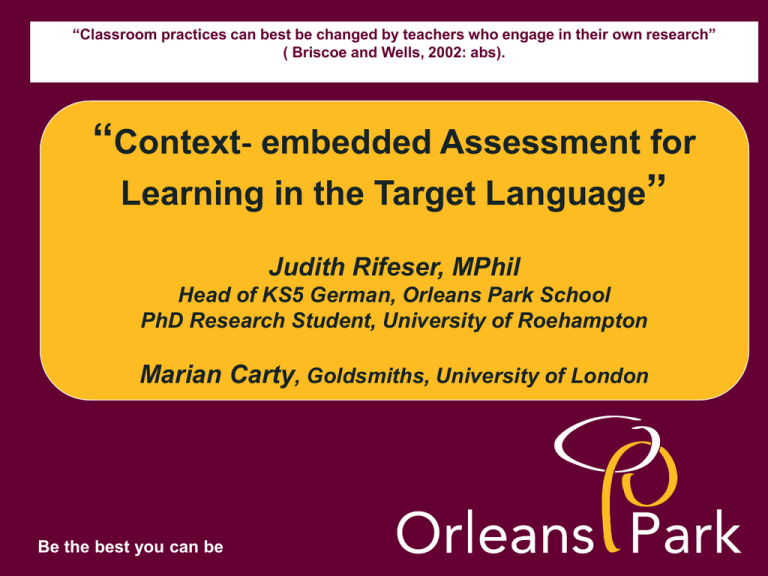
“Classroom practices can best be changed by teachers who engage in their own research” ( Briscoe and Wells, 2002: abs). “Context‐ embedded Assessment for Learning in the Target Language” Judith Rifeser, MPhil Head of KS5 German, Orleans Park School PhD Research Student, University of Roehampton Marian Carty, Goldsmiths, University of London Be the best you can be M. Carty & J. Rifeser 2015 What is Assessment for Learning? Assessment Reform Group (UK 2002): ‘Assessment for Learning is the process of seeking and interpreting evidence for _____ learning learners teachers to decide by ______and their ______ learning where the ______ learners are in their _______, where they need to go and how best to get there. Assessment for Learning is also Formative known as ______________’. Assessment Be the best you can be M. Carty & J. Rifeser 2015 Activities associated with summative assessment (Assessment of Learning) result in an evaluation of student achievement - for example, allocation to a level or standard or allocation of a letter or numerical grade, which might later appear in a report. Activities associated with formative assessment (Assessment for Learning) do not result in an evaluation. Information about what a student knows, understands and is able to do is used by both the teacher and the learner to determine where learners are in their learning and how to achieve learning goals. Be the best you can be M. Carty & J. Rifeser 2015 Assessment for Learning fair validity accurate focused link to GCSE criteria identifying barriers continuity reliable transferability consistent useful next steps Be the best you can be The Assessment for Learning Strategy M. Carty & J. Rifeser 2015 Start Routes Finish Y10 Progress GCSE Key issue identified by the department: Accuracy and grammatical awareness in KS4. My classroom based research 20th January – 25th March 2014 Y10 German Mixed Ability Preparation for 1st Controlled Assessment Be the best you can be M. Carty & J. Rifeser 2015 In conversation with the pupils about AfL Feedback from pupils: Key points to be addressed: Pupils want to know how to improve => pupils need to be given time to make improvements Pupils need to be confident about how to work by themselves Pupils want to know how this links to their attainment Pupils prefer prompt feedback How can I make AfL focused and useful? How can I assist them in becoming independent and confident about correcting their own mistakes? How does my feedback translate into NC levels and grades? How can I make my assessment and feedback both useful and efficient? Be the best you can be M. Carty & J. Rifeser 2015 What would be a successful outcome? Key issue identified by the department feedback is consistent, “constructive“ and „conducted …in the target language“; pupils are able to talk about their progress pupils are aware of their current attainment and know their targets and how to reach them pupils „demonstrate an increasingly high level of accuracy“ and “confidently apply grammatical rules to new situations” in KS4 the feedback and marking system must be transferable to the other key stages the feedback links to the criteria and all pupils are making progress Need to identify what A* “looks like” Be the best you can be pupils “secure outstanding progress”, and show “exceptional independence” M. Carty & J. Rifeser 2015 Adapting planning Integration of explicit grammar learning within a meaningful context. Assessment and feedback according to the strategies as developed by the department in the target language Integration of grammar elements into KS3 by ‘raising grammatical awareness through guided exploration‘ (J. Burch et.al.). Be the best you can be M. Carty & J. Rifeser 2015 Key grammatical rules are displayed in the classroom for reference Be the best you can be M. Carty & J. Rifeser 2015 GCSE preparation for controlled assessment, theme: “Ich habe gewonnen!” – preparation for accurate speaking Example of peer assessment and then selfcorrection Focus on specific grammar rule Pupils practise by translating sentences Peer assessment Be the best you can be KS4 AfL Preparation for Controlled Assessment M. Carty & J. Rifeser 2015 Feedback sheet 1) Steps to improve 2) Motivational comment & two main learning focuses 3) Current grade (specific elements) - Teacher has set clear improvement target Pupil has been given improvement time Pupil is able to see in which areas he is already working at a higher grade Pupil in Y10 Predicted Grade B at GCSE Be the best you can be M. Carty & J. Rifeser 2015 KS4 AfL Preparation for Controlled Assessment Draft 1 with number codes Pupils self-correct mistakes WWW - Teacher has set clear improvement target - Pupil has been given improvement time - Teacher acknowledges excellent work with ticks Pupil in Y10 Predicted Grade B at GCSE Be the best you can be M. Carty & J. Rifeser 2015 Draft 2 shows progress of pupil and areas for further development - Pupil has been given reflection and improvement time - Pupil responds - Pupil is challenged further to improve the grade Be the best you can be M. Carty & J. Rifeser 2015 Impact on pupils “intrinsic motivation + appropriate level of linguistic input = stimulating production” (Ellis,1992) According to Harris et al. (2001) “independence lies at the very heart of spontaneity”, and is therefore a pre-condition to linguistic success. ‘Pupils are confident speakers’ ‘Pupils can use language creatively and spontaneously’ Pupils show exceptional independence in their studies’ Pupils „demonstrate an increasingly high level of accuracy“ and “confidently apply grammatical rules to new situations” Be the best you can be I think that the new system of marking is beneficial because you can learn by correcting your own mistakes instead of the teachers correcting it for you. I now think about how to correct the sentences and what I did wrong rather than just looking at the correction already given (Student, Y10, GCSE Predicted Grade A). It’s really good and helps me see where I have gone wrong and how to correct it. It made me write more complex German. (Student, Y10 GCSE Predicted Grade C) The numbers are very useful. I can see what I have done wrong though the numbers, so number 9 will be like “You must put the verb at the end”. It is very useful and improves my learning. It also helps me to get work back quicker so we have more time to improve (Student, Y10, GCSE Predicted Grade B). M. Carty & J. Rifeser 2015 Moving from KS3 towards KS5 implicit KS3: Expose pupils allowing them to make mistakes Building of concepts Introduce language to talk about grammar KS4 Assist pupils in acquiring explicit knowledge of the rules and terminology Create opportunities to apply knowledge in familiar contexts explicit KS5 Create opportunities to apply knowledge in foreign contexts Be the best you can be M. Carty & J. Rifeser 2015 Key grammatical rules are integrated as classroom routines in KS3 Be the best you can be M. Carty & J. Rifeser 2015 Self-correction and peer- correction at KS3 and KS5 KS3 pupil corrects own work dialogue with teacher in TL Pupils correct their own work, making use of previously taught grammatical concepts Students take risks KS5 group work dialogue with teacher to correct work using TL Be the best you can be M. Carty & J. Rifeser, ALL Language World Conference 2015 Self-correction and peercorrection at KS5 KS5 Preparation for the oral exam in TL Dialogue pupils -> pupils Dialogue pupils -> teacher teacher -> pupils Pupils correct their own work, making use of previously taught grammatical concepts Students take risks Be the best you can be Datum: M. Carty & J. Rifeser 2015 Niveau Schreiben Writing Niveau 3 1. Man muss Meinungen geben (ich denke). 2. Man muss Konnekive benutzen (und, aber, weil). 3. Man muss das Glossar oder ein Wörterbuch benutzen. 1. You must give opinions (I think). 2. You must use connectives (and, but, because). 3. You must use your glossary or a dictionary. Niveau 4 4. Man muss den Komparativ (besser als, musikalischer als) oder den Superlativ (am besten) benutzen. 5. Man muss Wörter nicht auslassen. 6. Man muss Nomen in Deutsch groß schreiben (Punkte, Mutter, Freundin). 4. You must use the comparative (better than, more musical than) or the superlative (the best) 5. You must not leave words out. 6. You must write capital letters for all nouns (points, mother, female friend). Niveau 5 7. Man muss das Verb in Deutsch ans Ende kicken mit weil, wenn, obwohl, dass oder selbst wenn. 8. Man muss Verben ziemlich akurat schreiben (ich bin/ er/sie ist / wir sind / ich denke / du denkst /er/sie denkt /wir denken/ ich war/ wir waren). 9. Man muss Meinungen erklären. (ich denke…, weil…). 7. You must kick the verb to the end in German with ( because, when, although, that or even if). 8. You must write verbs quite accurately (I am/ he/she is/we are/ I think/ you think/ he/she thinks/ we think/ I was/ we were). 9. You must explain opinions (I think… because…). Niveau 6 10. Man muss Paragraphen mit vielen Details schreiben. 11. Man muss zwei oder drei akurate und komplexe Strukturen benutzen. 12. Man muss drei Meinungen mit drei Konnektiven geben. 10. You must write paragraphs with lots of details. 11. You must use two or three accurate and complex structures. Niveau 7 13.Man muss drei oder vier akurate, komplexe Sätze mit akuraten Verben schreiben. 14. Man muss die Wortstellung ziemlich richtig haben. 15. Man muss Ideen organisieren ( Zuerst … Zum Schluss). Niveau 8 16. Man muss kreative , originelle, komplexe Sätze schreiben. 17. Man muss sehr akurat schreiben. 18. Man muss die Wortstellung meistens richtig haben. Be the best you can be Pupils take ownership, self12. You must give three opinions with three connectives. correcting their 13. You must write three or four accurate, complexown sentences with work accurate verbs. 14.You must have the word order quite correct. according to level 15. You must organise your ideas (firstly…, finally…). descriptors written 16. You must write creative, original, complex bysentences. the department 17. You must write very accurately. 18. You must have the word order mainly totally correct. Mein Zielniveau M. Carty & J. Rifeser 2015 AfL and self-correction at KS3 Sample: Y8 class in their first year of learning German Afl 1 Autumn Term Pupils in KS3 correct their own work, making use of previously taught grammatical concepts Pupils write an assessment with an audience and a purpose Be the best you can be M. Carty & J. Rifeser2015 AfL and self-correction at KS3 Sample: Y8 class in their first year of learning German Pupils in KS3 correct their own work, making use of previously taught grammatical concepts Afl 2 Spring Term Be the best you can be Pupils write an assessment with an audience and a purpose M. Carty & J. Rifeser 2015 How is the school going to benefit? continuity transferability Be the best you can be How can we continue to raise ‘grammatical awaireness through guided exploration‘ (J. Burch et.al. 2001)? M. Carty & J. Rifeser 2015 Where are we heading now? Grammatical Discourse Communicative competence (Canale & Swain)i Socio-linguistic Be the best you can be Inter-cultural (Byram) Strategic M. Carty & J. Rifeser 2015 Progress – reflection on own practice Formative assessment 1) Content (Structure, register & form, nuance, engagement of the reader) 2) Grammar & spelling Focus on devising separate assessment criteria for content and grammar/spelling Be the best you can be Name:______________ Mein Zielniveau Schreiben Writing Die Wortstellung 1.Ist das Verb am Ende nach weil /obwohl/dass/da/wenn? 2.Denn, und, aber kickt das Verb nicht. Hast du es richtig? 3.Ist das Verb die zweite Idee? 4.Ist das Partizip am Ende? 5.Ist der Infinitiv am Ende? Word order 1.Is the verb at the end after weil/obwohl/dass/da/wenn? 2.Denn, und, aber don’t kick the verb. Do you have it right? 3.Is the verb the second idea? 4.Is the past participle at the end? 5.Is the infinitive at the end? Rechtschreiben 6.Ist das Wort akkurat? 7.Ist es ie oder ei? 8.Hat das Wort ein Umlaut ä ö ü? 9.Ist es sh oder sch? 10.Hast du ein Wort vergessen? ( kann / hat /ist …) Spelling 6.Is the word accurate? 7.Is it ie or ei? 8.Does the word have an umlaut ä ö ü? 9.Is it sh or sch? 10.Did you forget a word? (can/has/is?) ( kann / hat /ist) Verben und Zeitformen Das Präsens 11.Ist die Verbendung akurat? (ich bin/ er/sie ist / wir sind / ich denke / du denkst /er/sie denkt /wir denken/ ich war/ wir waren) Das Perfekt 12.Ist das Partizip mit haben? 13.Ist das Partizip mit sein? 14. Endet das Partizip mit t oder mit en? 15. Beginnt das Partizip mit ge / be / ver …? 16. Das Partizip ist nicht normal. Was ist es? Das Futur 17.Ist die Form von werden richtig? (ich werde/ du wirst / er/sie/es wird / ihr werdet / wir werden / sie/Sie werden) 18.Ist es ein Infinitiv? Modalverben 19.Ist das erste Verb richtig? Ich darf / er muss / wir können …. 20.Ist das zweite Verb ein Infinitiv? 21.Ist der Infinitiv am Ende? Verbs and tenses The Present tense 11.Is the verb ending accurate? (ich bin/ er/sie ist / wir sind / ich denke / du denkst /er/sie denkt /wir denken/ ich war/ wir waren) The perfect tense 12.Is the participle with haben? 13.Is the participle with sein? 14.Does the participle end in t or en? 15. Does the participle begin with ge / be / ver …? 16. The participle is not normal. What is it? The Future tense 17.Is the form of werden correct? (ich werde/ du wirst / er/sie/es wird / ihr werdet / wir werden / sie/Sie werden) 18.Is it an infinitive? Modal verbs 19. Is the first verb correct? 20. Is the second verb an infinitive? 21. Is the infinitive at the end? Negative 22.Ist es kein / keinen / keine / kein oder keine? 23. Ist es kein (e)(en) oder nicht? Negatives 22. Is it kein / keinen / keine / kein oder keine? 23. Is it kein (e)(en) oder nicht? Nomen und Artikel 24.Hast du das Nomen groß geschreiben? (Punkte, Mutter, Freundin) 25.Ist es Singular oder Plural? 26.Ist es der /die / das oder die? 27.Ist es ein / eine /ein (mein /meine /mein /meine)? Nouns and articles 24.Have you writen the noun with a capital letter? (Punkte, Mutter, Freundin) 25.Is it singular or plural? 26.Is it der/die/das oder die? 27.Is it ein/eine/ein (mein/meine/mein/meine)? Adjektive 28.Ist die Adjektivendung richtig? 29.Hast du den Komparativ richtig geschrieben? (besser als, musikalischer als) 30.Hast du den Superlativ richtig geschrieben? (am besten) Adjectives 28.Is the adjective ending correct? 29. Have you used the comparative correctly? (besser als, musikalischer als) better than, more musical than) 30. Have you used the superlative correctly? (am besten) (the best) Be the best you can be Satzzeichen AfL Feedback sheet Grammar/spelli ng Punctuation M. Carty & J. Rifeser 2015 Sources DCSF-00341-2008 available at https://www.education.gov.uk/publications-dfe [accessed 15th March 2014] Doughty, C. & Williams, J. (1998). ‘Issues and terminology’, Focus on Form in Classroom Second Language Acquisition. Cambridge: Cambridge University Press, pp. 1-12. Harris, V. & J. Burch et al. (2001). Something to Say. London: CILT. James Burch et.al. (unknown) Growing Grammar in the Classroom Johnstone, R. (1989). Communicative Interaction. London: CILT Ofsted Modern Language Survey Visits December 2013 Presentation by Alex Leggett, Sept 2013, Learn Project – University of Bristol (2000, 200 students yr3-13), Lampton, and Inset OPS common denominators Be the best you can be
